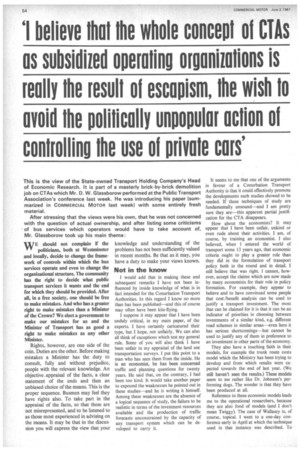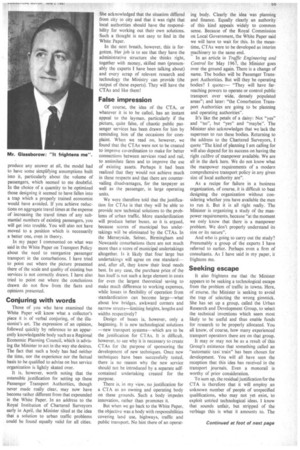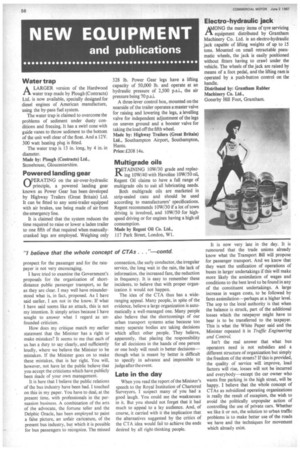`I believe that the whole concept of CTAs as subsidized
Page 56

Page 57

Page 58

If you've noticed an error in this article please click here to report it so we can fix it.
operating organizations is really the result of escapism, the wish to avoid the politically unpopular action of controlling the use of private cars'
This is the view of the State-owned Transport Holding Company's Head of Economic Research. It is part of a masterly brick-by-brick demolition job on CTAs which Mr. D. W. Glassborow performed at the Public Transport Association's conference last week. He was introducing his paper (summarized in COMMERCIAL MOTOR last week) with some entirely fresh material.
After stressing that the views were his own, that he was not concerned with the question of actual ownership, and after listing some criticisms • of bus services which operators would have to take account of, Mr. Glassborow took up his main theme :
WE should not complain if the politicians, both at Westminster and locally, decide to change the framework of controls within which the bus services operate and even to change the organizational structure. The community has the right to decide what public transport services it wants and the end for which they should be provided. After all, in a free society, one should be free to make mistakes. And who has a greater right to make mistakes than a Minister of the Crown? We elect a government to make our mistakes for us and the Minister of Transport has as good a right to make mistakes as any other Minister.
Rights, however, are one side of the coin. Duties are the other. Before making mistakes a Minister has the duty to consult, fully and without prejudice, people with the relevant knowledge. An objective, appraisal of the facts, a clear statement of the ends and then an unbiased choice of the means. This is the proper sequence. Busmen may feel they have rights also. To take part in the appraisal of the facts, so that these are not misrepresented, and to be listened to as those most experienced in advising on the means. It may be that in the discussion you will express the view that your knowledge and understanding of the problems has not been sufficiently valued in recent months. Be that as it may, you have a duty to make your views known.
Not in the know
I would add that in making these and subsequent remarks I have not been influenced by inside knowledge of what is in fact intended for the Conurbation Transport Authorities. In this regard I know no more than has been published—and this of course may often have been kite-flying.
I suppose it may appear that I have been unduly critical, in my main paper, of the experts. I have certainly caricatured their type, but I hope, not unfairly. We can also all think of exceptions which test my general rule. Some of you will also think I have been unfair in my appraisal of the land use transportation surveys. I put this point to a man who has seen them from the inside. He is an economist, he has been concerned traffic and planning questions for twenty years. He said that, on the contrary, I had been too kind. It would take another paper to expound the weaknesses he pointed out in these studies—and he is writing it himself. Among these weaknesses are the absence of a logical sequence of study, the failure to be realistic in terms of the investment resources available and the production of traffic forecasts unconstrained by the capacity of any transport system which can be developed to carry it.
It seems to me that one of the arguments in favour of a Conurbation Transport Authority is that it could effectively promote the developments such studies showed to be needed. If these techniques of study are fundamentally unsound—and I am pretty sure they are—this apparent partial justification for the CTA disappears.
How about the economists? It may appear that I have been unfair, unkind or even rude about their activities. I am, of course, by training an economist. I also believed, when I entered the world of transport some 13 years ago, that economic criteria ought to play a greater role than they did in the formulation of transport policy both in the round and in detail. I still believe that was right. I cannot, however, accept the claims which are now made by many economists for their role in policy formation. For example, they appear to believe and to have convinced some people that cost/benefit analysis can be used to justify a transport investment. The most that can be claimed for it is that it can be an indicator of priorities in choosing between investments of a similar kind, e.g. different road schemes in similar areas—even here it has serious shortcomings—but cannot be used to justify any of them in preference to an investment in other parts of the economy.
They also have a touching faith in their models, for example the trunk route costs model which the Ministry has been trying to develop and from which results were expected towards the end of last year. (We still haven't seen the results.) These models seem to me rather like Dr. Johnson's performing dogs. The wonder is that they have been produced at all.
Reference to these economic models leads me to the operational researchers, because they are also fond of models (and I don't mean Twiggy). The case of Wallasey is, of course, topical. I went to a one-day conference early in April at which the technique used in that instance was described. To produce any answer at all, the model had to have some simplifying assumptions built into it, particularly about the volume of passengers, which seemed to me doubtful. In the choice of a quantity to be optimized those designing it seemed to have fallen into a trap which a properly trained economist would have avoided. If you achieve reductions on aggregate travel times at the expense of increasing the travel times of any substantial numbers of existing passengers, you will get into trouble. You will also not have moved to a position which is necessarily a better one, even in theory.
In my paper I commented on what was said in the White Paper on Transport Policy about the need to reorganize passenger transport in the conurbations. I have tried to point out where the picture presented there of the scale and quality of existing bus services is not correctly drawn. I have also tried to point out where the conclusions drawn do not flow from the facts and opinions presented.
Conjuring with words
Those of you who have examined the White Paper will know what a collector's piece it is of verbal conjuring, of the illusionist's art. The expression of an opinion, followed quickly by reference to an apparently knowledgeable body such as a Regional Economic Planning Council, which is advising the Minister to act in the way she desires. The fact that such a body has had neither the time, nor the experience nor the factual basis to be qualified to advise on bus service organization is lightly skated over.
It is, however, worth noting that the ostensible justification for setting up these Passenger Transport Authorities, though never made really clear, may now have become rather different from that expounded in the White Paper. In an address to the Royal Institution of Chartered Surveyors early in April, the Minister tilted at the idea that a solution to urban traffic problems could be found equally valid for all cities. She acknowledged that the situation differed from city to city and that it was right that local authorities should have the responsibility for working out their own solutions. Such a thought is not easy to find in the White Paper.
In the next breath, however, this is forgotten. Her job is to see that they have the administrative structure she thinks right, together with money, skilled men (presumably the experts I have been talking about) and every scrap of relevant research and technology the Ministry can provide (the output of these experts). They will have the CTAs and like them!
False impression
Of course, the idea of the CTA, or whatever it is to be called, has an instant appeal to the layman, particularly if the picture, quite false, of chaotic public passenger services has been drawn for him by reminding him of the occasions for complaint. When we read on, however, we found that the CTAs were not to be created to improve co-ordination to make for better connections between services road and rail, to assimilate fares and to improve the use of existing assets. Perhaps it had been realized that they would not achieve much in these respects and that there are countervailing disadvantages, for the taxpayer as well as the passenger, in large operating units.
We were therefore told that the justification for CTAs is that they will be able to provide new technical solutions to the problems of urban traffic. More standardization will produce better buses, so it is argued, because scores of municipal bus undertakings will be eliminated by the CTAs. In the Merseyside, Selnec, Birmingham and Newcastle conurbations there are not much more than a score of municipal undertakings altogether. Is it likely that four large bus undertakings will agree on one standard— and, after all, they know their local needs best. In any case, the purchase price of the bus itself is not such a large element in costs for even the largest theoretical saving to make much difference to working expenses, while losses in flexibility of operation from • standardization can become large—what about low bridges, awkward corners and narrow streets—limiting heights, lengths and widths respectively?
Design of buses is, however, only a beginning. It is new technological solutions —new transport systems—which are to be the justification for CTAs. It is difficult, however, to see why it is necessary to create CTAs for the purpose of sponsoring the development of new techniques. Once new techniques have been successfully tested, there is no reason why the new service should not be introduced by a separate selfcontained undertaking created for the purpose.
There is, in my view, no justification for a CTA as an owning and operating body on these grounds. Such a body impedes innovation, rather than promotes it.
But when we go back to the White Paper, the objective was a body with responsibilities covering land use, highways, traffic and public transport. No hint there of an operat ing body. Clearly the idea was planning and finance. Equally clearly an authority of this kind appeals widely to common sense. Because of the Royal Commission on Local Government, the White Paper said we will have to wait for this. In the meantime, CTAs were to be developed as interim machinery to the same end.
In an article in Traffic Engineering and Control for May 1967, the Minister goes over the ground again. There is a change of name. The bodies will be Passenger Transport Authorities, But will they be operating bodies? I quote:— "They will have farreaching powers to operate or control public transport over wide, densely populated areas"; and later: "the Conurbation Transport Authorities are going to be planning and operating authorities".
It's like the petals of a daisy: Not "yes" and "no", but "yes" and "maybe". The Minister also acknowledges that we lack the supermen to run these bodies. Returning to the address to the Chartered Surveyors, I quote "The kind of planning I am calling for will also depend for its success on having the right calibre of manpower available. We are all in the dark here. We do not know what the manpower requirements of a modern comprehensive transport policy in any given size of local authority are".
As a recipe for failure in a business organization, of course, it is difficult to beat designing the organization without considering whether you have available the men to run it. But it is all right really. The Minister is organizing a study of the manpower requirements, because "at the moment we only know that there is a manpower problem. We don't properly understand its size or its nature".
And who is going to carry out the study? Presumably a group of the experts I have referred to earlier. Perhaps even a firm of consultants. As I have said in my paper, it frightens me.
Seeking escape
It also frightens me that the Minister appears to be seeking a technological escape from the problem of traffic in towns. Here, of course, the Minister is seeking to avoid the trap of selecting the wrong gimmick. She has set up a group, called the Urban Research and Development Group, to select the technical inventions which seem most likely to be useful and thus enable funds for research to be properly allocated. You all knoW, of course, how many experienced transport operators there are on that group.
It may or may not be as a result of this Group's existence that something called an "automatic taxi train" has been chosen for development. You will all have seen the reception that this idea has received in the transport journals. Even a monorail is worthy of prior consideration.
To sum up, the residual justification for the CTA is therefore that it will employ an unknown number of people of unspecified qualifications, who may not yet exist, to exploit untried technological ideas. I know that sounds unfair, but stripped of the verbiage this is what it amounts to. The prospect for the passenger and for the ratepayer is not very encouraging.
I have tried to examine the Government's proposals for the organization of shortdistance public passenger transport, so far as they are clear. I may well have misunderstood what is, in fact, proposed. As I have said earlier, I am not in the know. If what I have said seems like an attack, this is not my intention. It simply arises because I have sought to answer what I regard as unfounded criticism.
How does my critique match my earlier statement that the Minister has a right to make mistakes? It seems to me that each of us has a duty to say clearly, and sufficiently loudly, where we believe the Minister to be mistaken. If the Minister goes on to make these mistakes, that is her right. You will, however, not have let the public believe that you accept the criticisms which have publicly been made of your own management.
It is here that 1 believe the public relations of the bus industry have been bad. I touched on this in my paper. You have to deal, at the present time, with professionals in the persuasion business. A combination of the arts of the advocate, the fortune teller and the Delphic Oracle, has been employed to paint a false picture, an unfair caricature, of the present bus industry, but which it is possible for bus passengers to recognize. The missed connection, the surly conductor, the irregular service, the long wait in the rain, the lack of information, the increased fare, the reduction in frequency. It is easy to remember these incidents, to believe that with proper organization it would not happen.
The idea of the CTA thus has a wideranging appeal. Many people, in spite of the evidence, believe a large organization is automatically a well-managed one. Many people also believe that the shortcomings of our urban transport systems arise because too many separate bodies are taking decisions which affect other people. They believe, apparently, that placing the responsibility for all decisions in the hands of one person or one body will result in better decisions— though what is meant by better is difficult to specify in advance and impossible to judge after the event.
Late in the day
When you read the report of the Minister's speech to the Royal Institution of Chartered Surveyors, I suspect many of you had a good laugh. You could see the weaknesses in it. But you should not forget that it had much to appeal to a lay audience. And, of course, it carried with it the implication that the alternatives suggested by the critics of the CTA idea would fail to achieve the ends desired by all right-thinking people. It is now very late in the day. It is rumoured that the trade unions already know what the Transport Bill will propose for passenger transport. And we know that they want the unification of operations of buses in larger undertakings if this will make more likely the assimilation of wages and conditions to the best level to be found in any of the constituent undertakings. A large increase in wages costs, to be followed by fares assimilation—perhaps at a higher level. The sop to the local authority is that when the balance is struck, part of the additional losses which the ratepayer might have to bear is to be transferred to the taxpayer. This is what the White Paper said and the Minister repeated it in Traffic Engineering and Control.
Isn't the real answer that what bus operators need is not subsidies and a different structure of organization but simply the freedom of the streets? If this is provided, the quality of service will improve, load factors will rise, losses will not be incurred and everybody—except the car owner who wants free parking in the high street, will be happy. I believe that the whole concept of CTAs as subsidized operating organizations is really the result of escapism, the wish to avoid the politically unpopular action of controlling the use of private cars. Whether we like it or not, the solution to urban traffic problems is to make better use of the roads we have and the techniques for movement which already exist.




























































































































































